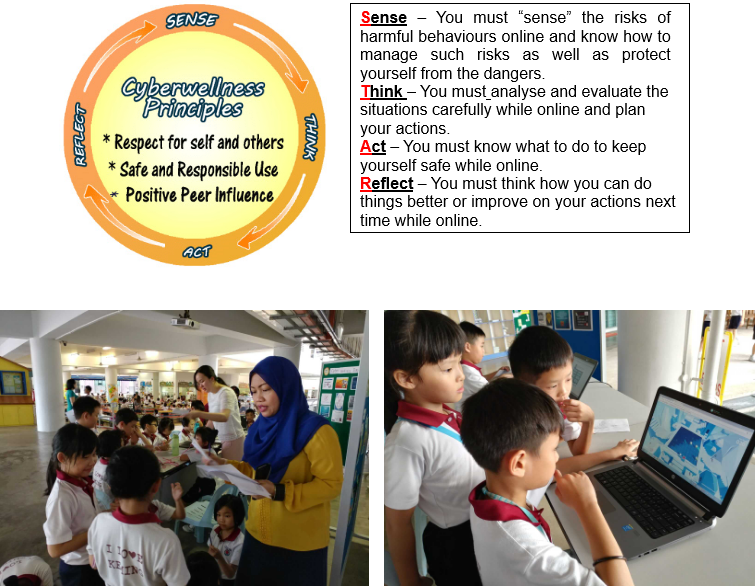ICT
Curricular Goal
Responsible and Future-Ready Digital Learners

Our goal is to realise Students As Designers In the 21st Century so that they will be future-ready and responsible digital learners. Our programmes aim to achieve the following objectives to realise the nation’s SMART vision.
Students will be able to
- demonstrate 21st CC skills through computational thinking and thinking skills,
- demonstrate respect, practise safe and responsible use of ICT and be a positive peer influence while online and
- develop ICT skills such as Microsoft office for the future workforce
PROGRAMMES
1. MEDIA LITERACY PROGRAMME (BASELINE STANDARDS)
The Baseline ICT Standards is a set of ICT skill competencies set out in two progressive Key Stages in primary schools. These represent the basic level of knowledge, skills and values that students need in order to fully benefit from a curriculum enriched with ICT, and eventually thrive in a technology-driven society. The standards are generic and are integrated into core subject and project work.
| Levels | Skills | Levels | |
| Primary 1 | Microsoft Word | Primary 4 | Google Doc |
| Primary 2 | Microsoft Word | Primary 5 | Google Slides |
| Primary 3 | Powerpoint Slides | Primary 6 | Search engines and emails |
2. CODING
As part of the national initiative to make Singapore a Smart Nation, our school conducted the Code for Fun Programme annually for all our Primary 6 students. The objectives of this training are to develop in our students basic computing literacy and skills that would enable them to become informed and responsible users of computing technology as well as to increase their exposure to coding.
The programme includes academic learning of related concepts using visual-based programming language and combining it with robotic kits to create a coding experience for the students. The coding lesson using microbit is infused into the Applied Learning Programme (ALP).

3. E-LEARNING
The rationale for having e-learning days is to allow our students to be familiar with the process of using our e-learning portal to prepare for a Home-based Learning scenario where students are required to stay and learn at home should there be a need for school closure in times of an emergency/pandemic.
Student Learning Space (SLS)
As part of its commitment to nurturing future-ready learners, MOE had announced that all students in Singapore schools will be supported in their learning by SLS, an online learning platform that contains curriculum-aligned resources and learning tools.
4. CYBER WELLNESS
Our cyber wellness framework, the S.T.A.R. approach, guides our students to be responsible digital users and protect themselves in cyberspace.

Cyber wellness Programmes aim to develop a child’s instinct to protect himself/herself and empower him/her to take responsibility for his/her own well-being in cyberspace.
Platforms used to educate students on Cyber wellness:
a) Lessons infused in FTGP
b) KMPS Tech Week
c) Techby(i)tes
d) Infocomm Club
e) Media Literacy Programme

